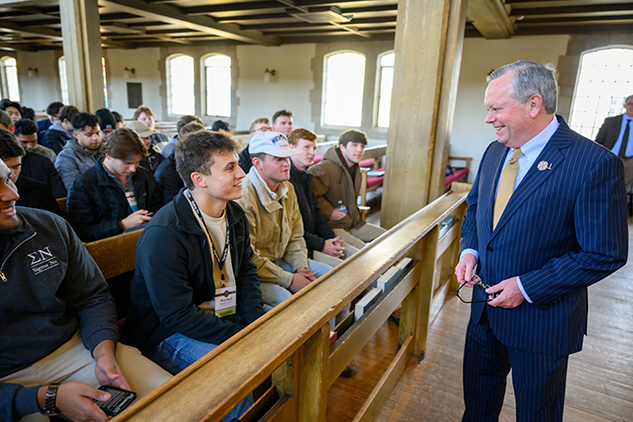Q&A with Regent Maury Gaston (Auburn)
Sigma Nu’s 68th Regent, Maury Gaston (Auburn), reflects on legacy, the power of fraternity membership, and his vision for the current biennium and the future of the Legion of Honor.
 You became an initiated member of Sigma Nu at Beta Theta Chapter (Auburn). What about the Fraternity or the collegiate chapter drew you to Sigma Nu?
You became an initiated member of Sigma Nu at Beta Theta Chapter (Auburn). What about the Fraternity or the collegiate chapter drew you to Sigma Nu?
My story links back to another of Sigma Nu’s Regents, Brother John M. Ward (Auburn). My dad, Charles Ware Gaston, Jr. (Auburn), along with many of his classmates from Sylacauga, Al., went to high school at Castle Heights Military Academy in Lebanon, Tenn. This was in the 1940s when military high schools were more popular and prevalent than they are today. Brother Ward was a former headmaster at Castle Heights and remained in close contact with the school and its students. When my dad attended Auburn University and joined the Beta Theta Chapter, he reconnected with Brother Ward, who was involved with the chapter as an alumnus volunteer and was serving nationally as the Fraternity’s Regent.
My dad had a wonderful Sigma Nu experience. I grew up looking at the ring on his finger, at his composite in his study, and hearing conversations between him and his chapter brothers, so I knew pretty well where I wanted to be.
As I reflect on my Sigma Nu story, I find it very interesting that it can all be traced back to John Ward. He was Beta Theta’s first Regent. Now, here I find myself in that same situation, and it looks almost providential.
Your role as an alumnus volunteer for the Fraternity began with your time as a member and President of the Beta Theta House Corporation beginning in 1997, followed by service as a Division Commander, Grand Chaplain, Vice Regent, Regent-Elect and now Regent. What has inspired and motivated you to get involved then and stay involved since your graduation?
I know my collegiate and alumni fraternity experience has been enriched by those who came before me, so I want to contribute to those who will come after me. As one of my Sigma Nu heroes said, “When you drink the water, remember who dug the well.” I’ve been refreshed by the water of others before me and hope to perhaps provide refreshment for those who come after me. We all stand on the history, traditions, and heroes of the past and, at the same time, are building the history, traditions, and heroes of those who will come after us. We must be good stewards for those who follow us.
In your remarks to the 70th Grand Chapter, you delivered a vision that “Sigma Nu will provide the best collegiate and alumni fraternity experience in America.” What does that vision mean to you?
I envision our collegians and alumni both having a greater awareness of how the Fraternity has enriched their lives and having a stronger desire to help others benefit from those same experiences and relationships.
We must avoid complacency and not take for granted this enrichment we’ve enjoyed from Sigma Nu. We should have a passion to share our experiences with others for their benefit as it benefited us. Awareness of our blessing of the Sigma Nu experience will create gratitude, and that gratitude will create a desire to give back to something so important and so much bigger than any individual.
You also spoke about the research released by Gallup that revealed the positive benefits of fraternity membership. Were there any findings that stood out as particularly powerful to you?
The Gallup findings and findings from other fraternity research are all powerful and impactful. There were three takeaways that I would like to highlight. First, fraternity members experience stronger mental health and wellness. This is especially significant in today’s environment. Fraternity members came out of the pandemic in better condition because they had a support network of close relationships at hand. It’s easy to get lost among 300 calculus classmates, on a campus of thousands, or behind an apartment or dorm door. But within the sheltering walls of a chapter, one can receive significant support and encouragement. Also, you may have heard the Surgeon General recently said there is an epidemic of loneliness and weak social connections, and its health risks are as serious as those of smoking. Fraternity relationships within both our collegiate and alumni experiences are an antidote.
Gallup also showed that fraternities serve as an accelerator for professional success. For example, fraternity men are 3x more likely to have a collegiate internship, almost 2x as likely to have secured full-time career employment before graduation, 2x as likely to encourage others to attend their alma mater, 5x as likely to donate to their alma mater, and more than 4x as likely to be a satisfied university alumnus. The amplification of those university affinities on the part of fraternity men is remarkable. For these and so many other reasons, fraternities should be embraced by university administrators, the public, the media, and all institutions in our culture and society. To be perfectly clear, fraternities improve and enrich our culture and our society.
Finally, fraternities create lifelong connections to the campus, community, and peers. Research shows fraternity membership not only better prepares for career-readiness, but also connects men to the university in a way non-members simply don’t experience. They are more satisfied as students and interestingly report feeling more supported by faculty. As evidence, on most campuses, fraternity men have higher grade point averages than non-affiliated men. Also, nearly half serve in a leadership role across campus. Without fraternity men, campus leadership would greatly suffer.
On campuses across the country, the concept and value of fraternity continue to be questioned. With these findings in mind, how can alumni and collegiate members better advocate for the fraternity experience?
Be personally aware, be comfortably conversant in discussing it, recruit quality young men to Sigma Nu whether they are in your family or attending your alma mater campus or another. Become proactive advocates for the fraternity experience in general and Sigma Nu in particular.
Those who oppose fraternities likely don’t understand the value we bring to society, to culture, and to universities. The fraternity experience makes a better man, a better citizen, a better husband, father, and employee. Our national organization plays a vital role in this message, but if our local members in their civic clubs, neighborhoods, schools, and churches would be more conversant about these measurable benefits, we could further communicate and increase awareness of the fraternity experience and its value to young men, families, and society.
In mid-August 2023, the High Council gathered in Lexington, Va., for a strategic planning retreat focused on goals for the biennium. At the conclusion of the retreat, the Council identified five strategic imperatives for the next two years: Chapter Strength, Alumni Commitment, Educational Excellence, Communication and Awareness, and Growth and Innovation. Is there a particular imperative you feel most passionate about seeing the Fraternity achieve?
They are all important and complementary to one another. In my view, Chapter Strength leads them all and contributes to the success of each. A strong chapter produces a positive collegiate and alumni experience. Our Pursuit of Excellence program, the criteria for Rock Chapter, outlines objective, metrics-based standards for Chapter Strength. It’s as good a set of metrics for organizational excellence as I’ve seen, and I’ve seen lots of them.
Alumni commitment and engagement continues to be a significant area of focus for Sigma Nu – a continuation of work started in recent years. Why has the Council increased the Fraternity's focus on engaging our alumni and volunteers?
Sigma Nu is for life. To paraphrase our Creed, the relationships we develop in the fresh morning of our youth will go with us unmoved into the darkening shadows of life’s closing day. If we have a life-long benefit, shouldn’t there be a life-long understanding and commitment?
What would be your advice to a young alumnus who is unsure of how he can support the Fraternity after graduation?
Get involved early on in the community where you begin your career. I moved far from home four times early in my career. I know from those experiences that community engagement is a key component of happiness, mental health, and well-being when a young person moves away, and Sigma Nu is a uniquely valuable organization for relationship building. There is likely a Sigma Nu Alumni Club or an Alumni Chapter in your community. The Fraternity can help you find it.
Also subscribe to and read everything the Fraternity and your chapter provides. Make sure your contact information is kept up to date. Change your collegiate e-mail to your post-graduate e-mail and keep your physical address up to date. Support our Educational Foundation which is working hard to ensure Sigma Nu has the resources we need to continue to thrive. A modest monthly gift soon multiplies. One can be a Black and Gold donor or an Omega donor with little impact on your monthly budget.
The council identified Chapter Strength as its top imperative for the biennium. What advice would you give to a Commander trying to turn a “good” chapter into a “great” one?
Be sure to engage your fellow chapter officers to ensure all leaders are on the same page and then engage your entire chapter in developing a strategic plan to define exactly what must be done to become a Rock Chapter. You must create a vision and then get everyone’s buy-in because it won’t happen overnight or without work and effort. We have professional staff and alumni volunteers who are ready to help you do all of this. Make sure you attend the College of Chapters in January where you can gain the knowledge, skills, and relationships you will need to effectively lead your chapter. Study the Pursuit of Excellence criteria and the Best Practices Library and implement those principles. Recruit alumni engagement with your chapter through the Alumni Advisory Boards and especially through in-person LEAD session facilitation. It's well worth it and gratifying. As Past Regent Robert Durham (Georgia) says, “Life in a Rock chapter is pretty good.”
